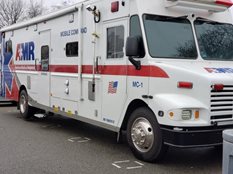GMR Mobilizes Two Additional Deployments to Assist with FEMA’s COVID-19 Responses in NYC and NJ
4.9.2020
Company sends hundreds of additional EMTs, Paramedics and Ambulances to New York; Also deploys crews and vehicles to provide EMS support in New Jersey.
(Dallas, TX) – Global Medical Response (GMR) mobilized a second deployment of American Medical Response (AMR) crews and ambulances to New York City and has sent additional teams and vehicles to New Jersey, in response to a FEMA request to help the federal government and local emergency personnel respond to the COVID-19 pandemic. This is the second major deployment in less than two weeks. On March 30, GMR deployed hundreds of EMS crews and ambulances to New York City in response to FEMA’s request. Those crews are still assisting FDNY medics and firefighters in New York.
“This pandemic is devastating hundreds of communities, and our crews are answering the call to assist local emergency medical service providers in the hard-hit areas of New Jersey and New York,” said GMR Chief Operating Officer Ted Van Horne. “It is heartbreaking to see how this virus is affecting over 1.5 million people globally. Our teams train year-round to help with crises, and now they are deploying to use their expertise to help patients in extreme need. They are dedicated to the patient who needs them.”
AMR has also contracted with other EMS companies around the country to assist with the deployment. The crews work under the guidance of FEMA, state and local governments when they arrive at their assigned areas.
GMR’s Office of Emergency Management activated the company’s National Command Center (NATCOM) in Dallas on Jan. 28 to monitor the spread of the virus closely and work with state and federal agencies to deploy teams for screenings, transports and evacuations. GMR’s medical leaders are working closely with the Centers for Disease Control, the World Health Organization and departments of public health around the country.
“We continue to carefully monitor our crews – those who are part of the FEMA deployment and those who remain in their home communities – to ensure that they remain safe and healthy,” said Dr. Ed Racht, GMR Chief Medical Officer.
Monitoring includes the following:
Van Horne emphasized that the recent deployments do not impact the company’s ability to meet the needs of patients in the thousands of communities where GMR has operations. GMR air and ground teams continue to provide emergency and non-emergency transports to tens of thousands of patients. “People continue to need emergency medical services, whether they are related to the virus or not, and we’ll be there for them.”
AMR is the primary medical ground transportation operation of parent company Global Medical Response. As the nation’s largest provider of ground medical transportation and FEMA’s prime emergency medical service response provider, AMR has a national agreement with FEMA to provide ground ambulance, air ambulance, paratransit services and non-ambulance EMS personnel to supplement the Federal and Military response to a disaster, an act of terrorism or any other public health emergency. Van Horne said teams prepare for emergency responses around the country with year-round training exercises, storing equipment and vehicles in strategic locations. This preparation enables the company to respond usually within 36-48 hours’ notice.
“This pandemic is devastating hundreds of communities, and our crews are answering the call to assist local emergency medical service providers in the hard-hit areas of New Jersey and New York,” said GMR Chief Operating Officer Ted Van Horne. “It is heartbreaking to see how this virus is affecting over 1.5 million people globally. Our teams train year-round to help with crises, and now they are deploying to use their expertise to help patients in extreme need. They are dedicated to the patient who needs them.”
AMR has also contracted with other EMS companies around the country to assist with the deployment. The crews work under the guidance of FEMA, state and local governments when they arrive at their assigned areas.
GMR’s Office of Emergency Management activated the company’s National Command Center (NATCOM) in Dallas on Jan. 28 to monitor the spread of the virus closely and work with state and federal agencies to deploy teams for screenings, transports and evacuations. GMR’s medical leaders are working closely with the Centers for Disease Control, the World Health Organization and departments of public health around the country.
“We continue to carefully monitor our crews – those who are part of the FEMA deployment and those who remain in their home communities – to ensure that they remain safe and healthy,” said Dr. Ed Racht, GMR Chief Medical Officer.
Monitoring includes the following:
- Evaluation of each crew member, which includes symptom and temperature checks every 12 hours
- GMR’s online infectious disease screening platform (GMR’s MAST – Medical Assessment and Screening Tool)
- 24/7-staffed Nurse Navigation and Physician team to assess, screen and monitor employees who have been in contact with COVID-19 positive or presumptive patients
- Phone calls and check-ins to GMR crews or personnel who have been quarantined or are self-isolating
Van Horne emphasized that the recent deployments do not impact the company’s ability to meet the needs of patients in the thousands of communities where GMR has operations. GMR air and ground teams continue to provide emergency and non-emergency transports to tens of thousands of patients. “People continue to need emergency medical services, whether they are related to the virus or not, and we’ll be there for them.”
AMR is the primary medical ground transportation operation of parent company Global Medical Response. As the nation’s largest provider of ground medical transportation and FEMA’s prime emergency medical service response provider, AMR has a national agreement with FEMA to provide ground ambulance, air ambulance, paratransit services and non-ambulance EMS personnel to supplement the Federal and Military response to a disaster, an act of terrorism or any other public health emergency. Van Horne said teams prepare for emergency responses around the country with year-round training exercises, storing equipment and vehicles in strategic locations. This preparation enables the company to respond usually within 36-48 hours’ notice.

